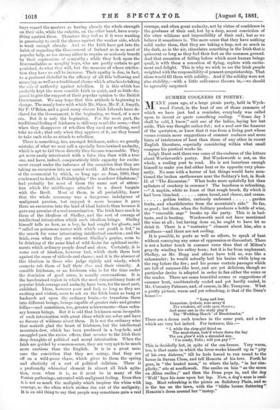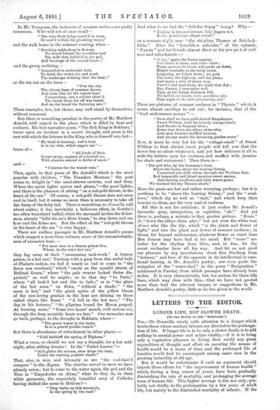M SUMMER COOLNESS IN POETRY. ANY years ago, at a large
picnic party, held in Wych- wood Forest, in the heat of one of those summers of
which we have just had a reminder, everybody was called upon to invent or quote something cooling. " Some day I shall be cold, I know," said one of the ladies, laying her hat aside. This was thought rather flat ; not a soul saw the humour of the quotation, or knew that it was from a living poet whose verses contain more suggestions of summer coolness and more hints of intolerance of heat than those of any other in recent English literature, especially considering within what small compass his poetical works lie.
Leigh Hunt said there was some of the coolness of the lettuce about Wordsworth's poetry. But Wordsworth is not, on the whole, a cooling poet to read. He is not luxurious enough himself to make you feel either heat or its opposite very pleas- antly. No man with a horror of hot things would have men- tioned the broken earthenware near the Solitary's hut, in Book II. of "The Excursion." What looks more spitefully hot than splinters of crockery in summer P The luncheon is refreshing, —" A napkin, white as foam of that rough brook, By which it had been bleached oaten bread, and cheese, and cream.
golden butter, curiously embossed garden fruits, and whortleberries from the mountain's side." So far, so good ; but then, when the Solitary produces a bottle of wine, the " venerable sage " breaks up the party. This is in bad- taste, and is heating. Wordsworth need not have mentioned the wine at all ; but having done so, he ought to have let us drink it. There is a " contrairy " element about him, also a gruffness—and these are not cooling.
It is possible, to poets as well as others, to speak of heat without conveying any sense of oppression or discomfort. There is not a hotter touch in summer verse than that of Milton's grey-fly winding his sultry horn ; but it is far from unpleasant. Shelley, as Mr. Hogg and others have told us, was like a salamander ; he would actually boil his brains while lying on the rug before the fire ; and his poems contain passages which are full of summer-like heat, and are yet delicious, though no particular device is adopted in order to fan either the scene or the reader. There are some beautiful scenes or suggestions of summer heat, unobtrusively cooled and yet hardly cooled, in Mr. Coventry Patmore, and, of course, in Mr. Tennyson. What a pretty picture, warm and yet refreshing, is that of the Dean's house !— " Long and low,
Geranium, lychnis, rose array'd The windows, all wide open thrown ; And some one in the study play'd The Wedding-March' of Mendelssohn."
There are a dozen such touches in the same poet, and a few which are very hot indeed. For instance, this :—
" I, while the shop-girl fitted on The sand-shoes, look'd where down the bay The sea glow'd with a shrouded sun. 'I'm ready, Felix; will you pay P "
This is decidedly hot, in spite of the sea-breeze. Very warm, too, is that canto in which the lover works himself up in " pity of his own distress," till he feels forced to run round to the house in Sarum Close, and tell Honoria of his love. Forth he goes, in "the heated noon," to where the lady, "in her sim- plicity," sits at needlework. She smiles on him " as the moon on .tea smiles ;" and then the Dean pops in, and the dog ' Wolf' lays his nose upon her lap. Now, a dog's nose is cool- ing. Most refreshing is the picnic on Salisbury Plain, and so is the tea on the lawn, with the " blithe breeze fluttering " Honoria's dress around her "instep." In Mr. Tennyson, the instances of summer coolness are pretty numerous. Who will not at once recall-
" The wine-flask lying conch'd in moss, Or cool'd within the glooming wave ;"
and the walk home in the summer evening, when-
" Brushing ankle-deep in flowers,
We heard behind the woodbine veil The milk that bubbled iu the pail, And buzzings of the honied hours ;"
and the group reclining-
" Immantled in ambrosial dark,
To drink the cooler air, and mark The landscape winking thro' the heat ;"
or the tea out on the lawn-
" O'er the sky
The silvery haze of stammer drawn, And calm that let the tapers burn Unwavering; not a cricket chirr'd, The brook alone far off was heard, And on the board the fluttering urn P"
'These examples, few, but choice, may well stand by themselves, without comment.
But there is something peculiar in the poetry of Mr. Matthew Arnold, with regard to the place which is filled by heat and coolness. His best narrative poem," The Sick King in Bokhara," tarns upon an incident in a severe drought, and great is the zest with which the listener to the King, who is himself very hot-
" My head is burning; and a heat hears of- Is in my skin, which angers me "—
" All kinds of fruit, Grape syrup, squares of coloured ice, With cherries served in drifts of snow,"
and- • "Cisterns for the winter rain."
Then, again, in that poem of Mr. Arnold's which is the most popular with chi:dren, " The Forsaken Merman," the poet -seems to delight in " the sand-strewn caverns, cool and deep, Where the spent lights quiver and gleam,"—the spent lights; and there is the pleasure of sitting " on a red-gold throne, in the heart of the sea." Of course, a red-gold throne does not seem cool in itself, but it seems no more than is necessary to take off the damp of the fishy tail. There is something so clammily cold about scales ; it has inevitably a ludicrous effect, in Goethe's too-often translated ballad, when the mermaid invites the fisher- man, already "kiihl bis an's Herz hinan," to step down and see how cool the fishes are. But the effect of the " red-gold throne in the heart of the sea " is very happy.
There are endless passages in Mr. Matthew Arnold's poems -which suggest a more than ordinary sense of the uncomfortable- ness of excessive heat :-
" For most men in a brazen prison live,
Where, in the sun's hot eye,"
they fag away at their "unmeaning task-work." A brazen prison, in a hot sun! Turning with a gasp from this awful bull- -of-Phalan.; notion, we feel it nearly as bad to come to " the fierce sun overhead," which " smote on the squalid streets of Bethnal Green," where " the pale weaver looked thrice dis- pirited," as well he might; or to that day "In Paris," where " all look'd hot and like to fade ;" or to " the glare of the hot noon " on Etna, " without. a shade ;" " the noon is hot," and " the giant spires of the yellow bloom of the sun-loving gentian in the heat are shining on those naked slopes like flame." "A lull in the hot race," "The clay in his hotness," " So pilgrims bound for Mecca prayed. At burning noon," " Some two hours' march, with serious air, through the deep noontide heats we fare." Our memories now -go back, perhaps, to the drought in Bokhaia, where- " The green water in the tanks
Is to a putrid puddle turn'd."
But there is abundance of refreshment in other places :— " Cold babblefl the spring of Tilphnsa."
What a verse, or should we not say a draught, for a hot mid- night, after stifling dreams ! In the " Faded Leaves "-
"Still glides the stream, slow drops the boat,
Under the rustling poplars' shade."
That, also, is nice, and intensely so are "the cool-hair'd -creepers " in the ./Egean. The cherries served in snow we have already eaten ; but to come to the water again, the god and the Nine in " Empedocles on iEtna," what do they do, in their white garments, the exquisitely beautiful song of Callicles baying shifted the scene to Helicon P-
" They bathe on this mountain, In the spring by the road."
And what do we find the " Scholar Gipsy" doing P Why-
" Trailing in the coal stream [his] fingers wet, As ill.: punt's rope chops round ;"
on a summer n:gilt, near " the stapling Thames at Bab-lock- hithe." After the " breathless solitudes " of the uplands, "Fausta" and her friends almost shoat at the pro -pe:t of cool- ness and refreshment :-
" 0 joy! again the farms appear; Cool shade is there, and rustic cheer ; There springs the brook, will guide DB down, Bright comrade, to the noisy town. Lingering, we follow down ; we gain The town, the highway, and the plain; And many a mile of dusty way, Parch'd and road-worn, we made that day ; But, Fausta, I remember well
That, as the balmy darkness fell,
We bath'd our hands, with speechless glee, That night in the wide-glimmering sea."
There are pictures of summer coolness in " Thyrsis " which it seems almost sacrilege to cut out ; for instance, that of the "high midsummer pomps "
" Soon shall we have gold-dusted Snapdragon,
Sweet William, with its homely cottage-smell, And Stock., in fragrant blow ; Roses that down the alleys shine afar, And open Jasmine-muffled lattices, And groups under the dreaming garden-trees."
Now, it must be very hot for the " cottage-smell " of Sweet William to float abroad (most people will tell you that the flower has no odour whatever); and yet how delicious it all is, with the lattices open for coolness, and muffled with jasmine for shade and retirement ! Then there is- " The girl who, by the boatman's door,
Above the locks, above the boating throng, Unmoored our skiff, when, through the Wytham flats, Red loosestrife and blond meadow-sweet among, And darting swallows and light water-gnats, We tracked the shy Thames shore."
Here the gnats are hot and rather worrying, perhaps ; but it is soothing to be " above the boating throng ;" and the " swal- lows," which dip as well as " dart," and which keep their bosoms so clean, are the very soul of coolness.
All this is not for criticism ; it just evokes Mr. Arnold's favourite gasp, interjection, or expletive, " ah !" And yet there is, perhaps, a mistake in that garden picture. " Roses " do "down the alleys shine afar ;" but not even the white rose shines afar like the lily, which " is the plant and flower of light," and also the plant and slower of summer coolness ; in bloom far beyond midsummer, whatever flower or exact time Ben Jonson may have had in his mind. But " roses " are better for the rhythm than lilies, and, in fine, let the sweet enchanter have all his way. And let us not spoil our pleasure by any speculations about this flinching from " hotness," and love of the opposite in its intellectual or emo- tional bearing, in Mr. Arnold's poetry ; nor even quote the metaphor of the " water-shed " in the poem " Resignation " (addressed to Fausta), from which passages have already been stolen. It is very characteristic, but too serious for these idle lines, which may close with this,—that we have not quoted more than half the relevant images or suggestions in Mr. Matthew Arnold's poetry, little-as he has given to the world.































 Previous page
Previous page